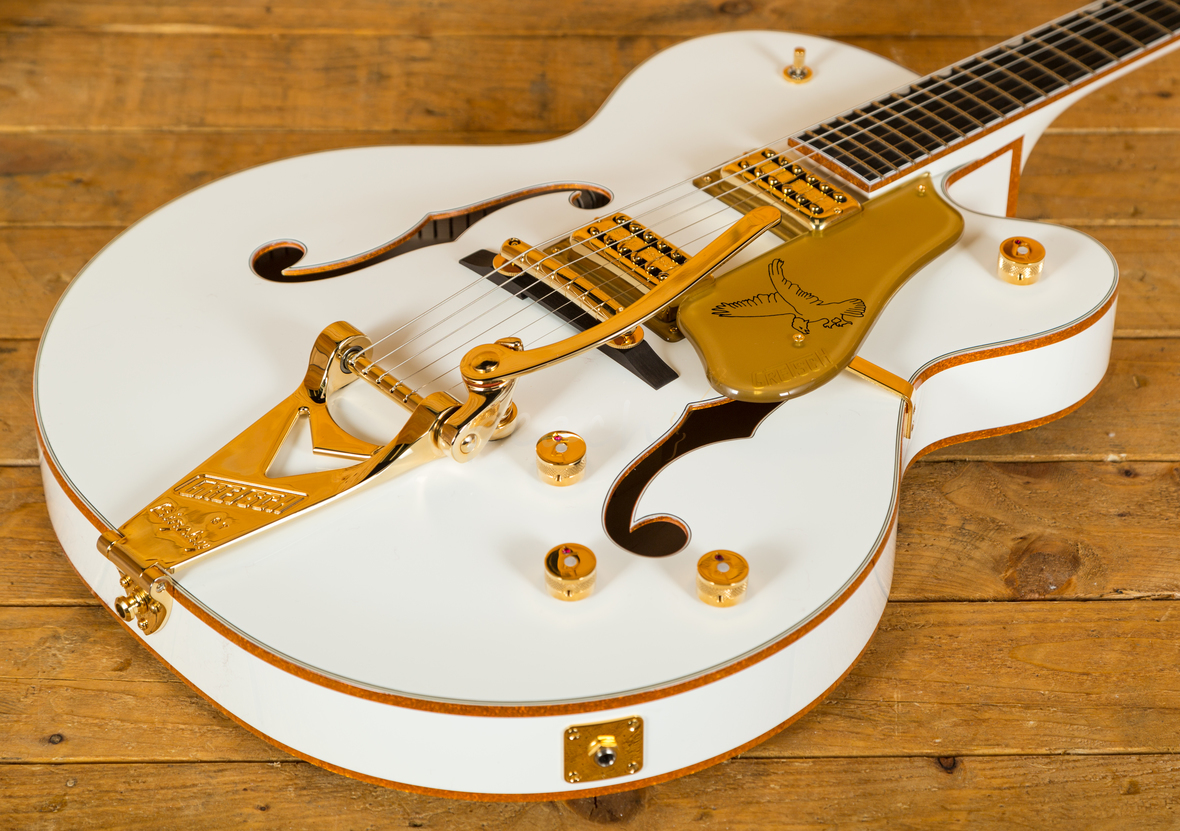

While the White Falcons of the era remain more collectible, players who prefer a little less flash and glitz will probably be drawn to the Country Club. While the White Falcons of the era remain more collectible, players who prefer a little less flash and glitz will probably be drawn to the Country Club Given its body size, scale length, and electronics, this guitar is entirely comparable in sound and performance to the early ’60s White Falcon, with a look that’s slightly understated, but still elegant and upmarket. All hardware is gold plated, and the multi-ply binding and purfling around the body, ebony fretboard, and headstock help to dress up the model. Up at the other end, across the zero fret that Gretsch guitars of the era carried, a set of Grover Imperial tuners dress up the headstock. Originally designed to allow easy user adjustment of string spacing, this bridge also has the benefit of smoothly rolling saddles that help to avoid string-hitch during vibrato use. The Bigsby vibrato tailpiece, optional in the day, and a period-correct addition here, retains smooth action over the Space Control bridge.


#Gretsch white falcon players edition review install
This “bonus feature” hails from an era when it was apparently deemed worth cutting a couple of holes into the top of a perfectly good guitar to install a clunky device that would save you from having to palm mute the strings yourself, thereby producing that plinka-plinka guitar sound (and often slightly out of tune at that). One element of the design that many players today might rather dispense with is the mechanical string mute.Īlso found on other high-end Gretsch electrics of the day, it consisted of a bar covered with rubberized foam that could be raised up into contact with the strings between the bridge and bridge pickup by twisting a small knurled knob (the thing on the lower bout that looks like a miniature control knob, with a red felt protector ring beneath it). While they don’t offer the same midrange punch and easy grind as the slightly bigger, more powerful Gibson humbuckers, they do help the Gretsches that have them transition a little more easily from twang and jangle to crunched-up rock and roll. It evolved out of its DeArmond-made Dynasonic single-coil pickups in 1958 and into a pair of Gretsch-made Filter’Trons.ĭesigned by Ray Butts at the behest of Chet Atkins – and developed in the mid ’50s at a pace that rivaled Gibson’s PAF humbucker, which beat it into production by about one year – the Filter’Tron humbuckers delivered a crisp, bright performance that aimed to retain the existing characteristics of “that great Gretsch sound,” while effectively eliminating much of the 60-cycle hum. Electronically, the Country Club toes the line for upper-range Gretsch guitars of the era.

Incidentally, Gretsch made the guitar a full-depth model again in 1964, and the Country Club never moved into the double-cutaway body that most others adopted in the ’60s.


 0 kommentar(er)
0 kommentar(er)
